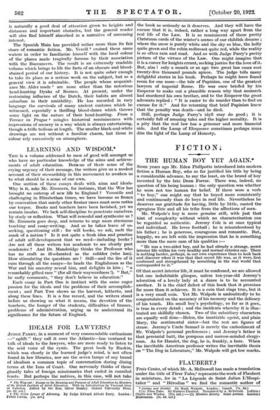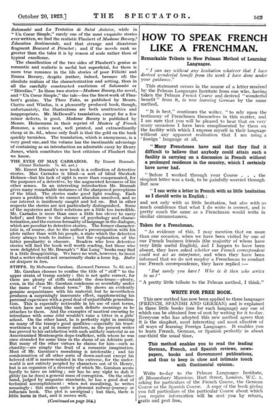FLAUBERT .t Trois Conies, of which Mr. A. McDowell has
made a translation under the title of Three Tales,' represents the work of Flaubert in miniature, for in " La Legende de Saint Julian L'Hospi- taller " and " Hdrodias " we find the romantic author of • Jeremy and Ramie& By Hugh Walpole. London : Cassell. [7s. 6d.] t (1) Three Tales. By Gustave Flaubert. Translated by A. McDowall. London I Chatto and Windom. [21s. net.]—(2) Madame Eatery. Same Author, London& Heinemann. [is, 6d, net.1 Salanunbo and La Tentation de Saint Antoine, while in " Un Coeur Simple," surely one of the most exquisite stories ever written, we find the realistic Flaubert of Madame Bovary,2 Education Sentimentale, and that strange and disastrous fragment Bouvard et Picuchet ; and if the novels rank as greater than the tales it is by reason of scale rather than of typical excellence.
The classification of the two sides of Flaubert's genius as romantic and realistic is useful but superficial, for there is more true romance in the life stories of poor Felicite and Emma Bovary, despite (rather, indeed, because of) the absolute realism of the characterization and .setting, than in all the carefully constructed exoticism of Salammbo or " Herodias." In those two stories—Madame Bovary, the novel, and " Un Coeur Simple," the tale—lies the finest work of Flau- 'bert's genius. The Three Tales, as published by Messrs. Chatto and Windus, is a pleasantly produced book, though, unfortunately, the illustrations are both unattractive and inappropriate. Mr. McDowall's translation, except for a few minor defects, is good. Madame Bovary is published by Messrs. Heinemann in their reprint of Masters of French Romance, a series neat, well printed, and extraordinarily cheap at 3s. 6d., whose only fault is that the gold on the back quickly tarnishes. The translation, which is anonymous, is a very good one, and the volume has the inestimable advantage of containing as an introduction an admirable essay by Henry James, which constitutes the best criticism of Flaubert that we know.











































 Previous page
Previous page